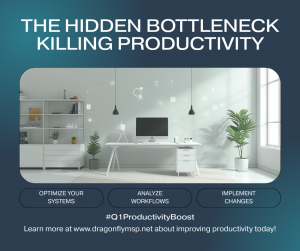July 26, 2025
AI Can Boost Your Business, But It Can Also Put Your Data at Risk
Artificial intelligence (AI) is everywhere right now. Tools like ChatGPT, Google Gemini, and Microsoft Copilot are transforming how businesses work, helping teams draft emails, respond to customers, summarize meetings, and even write code or manage spreadsheets.
AI can absolutely save time and increase productivity.
But here's the catch: if your team uses it carelessly, it can expose sensitive data and create serious security risks.
Why Small Businesses Need To Pay Attention
The danger isn't the AI itself it's how people use it.
When employees copy and paste confidential information into a public AI tool, that data can be stored, analyzed, or even used to train future models. That means sensitive financial details, client records, or proprietary information might be exposed without anyone realizing it.
👉 A real-world example: In 2023, Samsung engineers accidentally leaked internal source code into ChatGPT. According to Tom's Hardware, the incident was serious enough that Samsung banned public AI tools companywide.
Now imagine someone on your team pasting a client's financials or health information into a public AI platform "just to get a quick summary."
In seconds, you've got a data leak.
A New Twist: Prompt Injection
Beyond accidental oversharing, cybercriminals are using a technique called prompt injection to manipulate AI tools. They hide malicious commands inside emails, PDFs, transcripts, or even video captions. When an AI processes that content, it can be tricked into revealing information or performing actions it shouldn't.
In other words, the AI itself can be weaponized without the user even realizing it.
Why Small Businesses Are Especially Vulnerable
Many small businesses don't have AI usage policies in place. Employees adopt tools on their own, assuming they're safe—just smarter versions of a search engine.
Without clear guidance, they may inadvertently share confidential data.
And very few organizations actively monitor how AI is being used internally.
How To Use AI Safely
You don't have to ban AI to stay secure. But you do need a plan.
Here are four steps to protect your company:
✅ Create an AI usage policy.
Clearly define which tools are approved, what data must never be shared, and who employees can contact with questions.
✅ Educate your team.
Explain how public AI tools work, why prompt injection is dangerous, and what safe usage looks like.
✅ Use business‑grade tools.
Encourage employees to use platforms like Microsoft Copilot, which provide enterprise-level privacy and compliance controls.
✅ Monitor AI usage.
Track which tools are being used on company devices, and consider blocking unapproved platforms if necessary.
The Bottom Line
AI isn't going away, and businesses that learn to use it responsibly will have a competitive edge.
But ignoring the risks can lead to data leaks, compliance violations, and costly breaches.
It only takes one careless copy‑and‑paste to put your business at risk.
Let's Make Sure Your AI Use Is Safe
We'll help you create a smart AI policy, train your team, and choose the right tools to keep your data secure without slowing down productivity.
📧 Email:Hello@dragonflymsp.net
📞 Call: +1 888‑498‑2019
🌐 Book your free consultation today:www.dragonflymsp.net



